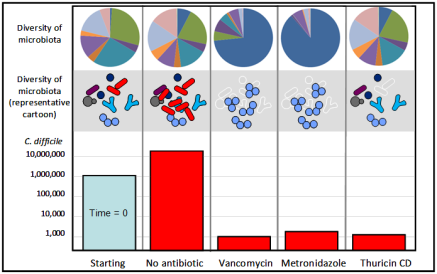The simple word of GUT MICROBIOTA: Fecal Bacteria or Poop Bacteria.
There has been a significant increase of publications related to intestinal microbiota in the past years. More grants and research publications have noticed the importance and significance of fecal bacteria. Why? Maybe because of health benefits, treatment options or in understanding the origins of bacteria.
There are trillions of bacteria that inhabit on our bodies and within our bodies. They could be categorized into normal flora – living harmoniously within their host or pathogenic – able to cause bodily harm to humans. Regardless, of how clean you want to be – microorganisms colonize everywhere. The most heavily colonized system of bacteria is within the gastrointestinal tract (GIT).
The complexity of the harmonious gut microbiota is fairly difficult to study, as scientist theorize that there are a certain core group of bacteria that make up a common profile within everyone in the world. However, there is still not significant research evidence that suggest this. Why? because the gut microbiota is influenced by various of external and internal factors that make up the unique profiling of each individual’s microbiota:
- Age
- Diet
- Environment
- Excerise
- Health Status
- Medicine Status
AGE:
A research conducted by Hopkins. et al. (2002). examined the stool samples of three different populations (children, young adults, and elderly). Results found that younger population have less complexity of bacterial diversity, while elderly individuals favour the colonization of the bacteroides species group[1].
DIET:
What you eat defines your gut microbiota and system? Of course it does. In the supermarkets, do you hear probiotics in everything these days? The bacteria is considered ‘healthy bacteria’ that helps with digestion. [Disclaimer: minimal effects are observed but is it possible to permanently alter your system – this still needs to be proven]
The purpose of bacteria within your gut is to aid in the metabolism and digestion of food. There is a value in observing the contribution of diet in altering your microbiota – the possibility of creating a food or pill that could alter your microbiota to aid in health diseases is a huge market to be researched into. A recent study conducted by Graf. et al.(2015). summarizes the evidence in vivo human studies of gut microbiota-modulating of diet. I urge everyone to give this a read – what is the profile of a vegetarian or vegan diet? Or the profile between eastern diet, Mediterranean diet or western diet? Click here.
HEALTH & MEDICINE STATUS:
What if you are sick and you are taking heavy doses of strong antibiotics. The purpose of antibiotics is to kill bacteria. Yes, it will also kill certain groups of bacteria within your gut – this allows the opportunity for other groups of bacteria to further colonize or to be the dominant group. You had a perfectly harmonized system and now it is disrupted. Is this bad? It could be. It could allow more resistance strains of bacteria to live within the gut – MRSA or ESBL. Heard of those? A summary article written by Modi et al. (2014). provides two perspectives – ecological and molecular approach can further explain this idea. Click here to be referred to the pdf file.

Antibiotics & its effect on the diversity of gut microbiota. Image obtained from Cotter. et. al. (2012). [4] Click here for the article.
Check these links out:
http://www.gutmicrobiotawatch.org/en/gut-microbiota-info/
http://www.nature.com/nrgastro/focus/gutmicrobiota/index.html
[1] Hopkins, M. J., Sharp, R., & Macfarlane, G. T. (2002). Variation in human intestinal microbiota with age. Digestive and Liver Disease, 34, S12-S18.
[2] Graf, D., Di Cagno, R., Fåk, F., Flint, H. J., Nyman, M., Saarela, M., & Watzl, B. (2015). Contribution of diet to the composition of the human gut microbiota. Microbial Ecology in Health and Disease, 26, 10.3402/mehd.v26.26164. http://doi.org/10.3402/mehd.v26.26164
[3] Modi, S. R., Collins, J. J., & Relman, D. A. (2014). Antibiotics and the gut microbiota. J Clin Invest, 124(10), 4212-4218.
[4] Cotter, P. D., Stanton, C., Ross, R. P., & Hill, C. (2012). The impact of antibiotics on the gut microbiota as revealed by high throughput DNA sequencing. Discovery medicine, 13(70), 193-199.
Serena has earned a Honours B.Sc in Biochemistry at McMaster University in 2014. She is currently continuing her education to become a Medical Laboratory Technologist. Serena is a strong believer in the advocacy of science and its prospective research. As a future healthcare professional, she wants to be an educator in teaching the general society about the current healthcare crisis situations that we face today, to spark interest and hopefully solutions.
